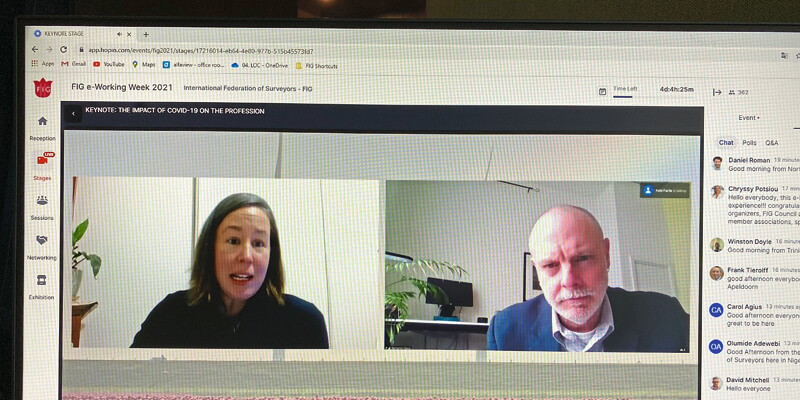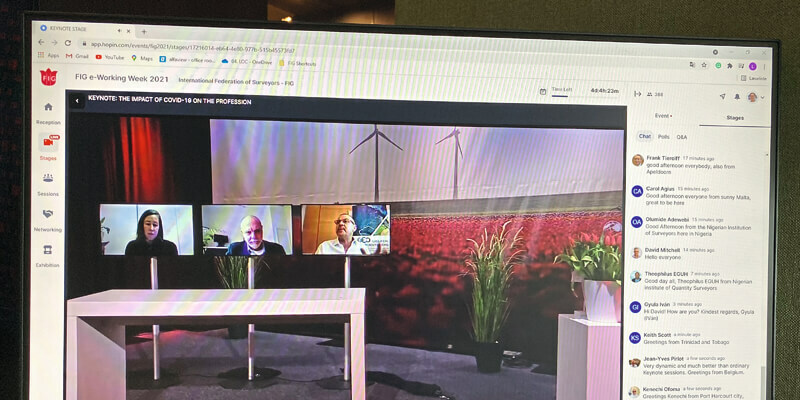The global pandemic has fundamentally changed the geospatial industry worldwide. But as we continue to be battered by world events in 2022, it’s clear there will be no ‘return to normal’, say Kate Fairlie, Hartmut Müller and Louise Friis-Hansen

The impacts of the global pandemic are not equal across cultures and economies: different regions, different specialisations, different sectors and industries have all been affected – and hence responded – in different ways. Covid-19 has exacerbated inequality, furthering the divides between urban and rural, rich and poor, developed and developing. Given the spatial dimensions at play, the surveying profession arguably has a responsibility not just to respond, but to direct change for the better: identifying the practices to leave behind and those to embrace for the future.
At the FIG e-Working Week 2021, a panel was brought together to discuss the impacts of Covid-19 on the profession. The panel was moderated by Kate Fairlie, land administration specialist and former chair of FIG Young Surveyors Network; and consisted of Benjamin Davis, director, inclusive rural transformation and gender equality division, FAO; Steven Ramage, head of external relations at Group on Earth Observations (GEO); and Léa Bodossian, secretaire generale directrice executive, EuroGeographics.

The discussion took the lens of three member-oriented international organisations – GEO, EuroGeographics and FAO – to determine what impacts they and their networks have experienced, how they are adapting, and what they see as the future of the surveying and geospatial professions in a post-pandemic world. Equality was a key theme of the discussion, with Covid-19 alternately influencing both democratisation and elitism in responses. The following builds on the themes discussed to evolve a plan of action for FIG in 2022 and beyond.
Videoconferencing as enabler and barrier
Covid-19, through videoconferencing uptake and growth in familiarity, has increased the speed and accessibility of collaboration. Whether this has flattened existing hierarchies is more nuanced: certainly, there has been greater opportunity to decentralise organisational knowledge and meeting attendance – but this has not brought about universal inclusion. Videoconferencing requires fast and reliable internet, a home office or other location free from interruption, and attendees need sufficient data to participate. This invariably privileges those in western societies and limits or excludes many of the world’s indigenous and remote communities. ‘
Socially-distanced’ modes of working limit participation and effective communication, and further distance ‘experts’ from citizens and beneficiaries, again compounding gender and other biases.
For FIG, it is clear that the growing dominance and improved technologies of digital communication presents a huge opportunity for rapidly growing and communicating the work of commissions, working groups and networks.
We can also feel the eagerness of the FIG community to meet in person again – and acknowledge that meeting in person cements connections and promotes online efficiencies. However, there remains a need to be explicit about the extent and nuances of openness, participation and accessibility. The ongoing presence of Covid, not to mention 2022’s other solidifying crises, will likely continue to limit the presence and participation.

Knowledge management, spatial apps and peer-to-peer support
Digitalisation, greater online presence and improved virtual interactions also facilitate better knowledge management and peer-to- peer support across contexts. For example, European cadastres have been able to learn from each other when digitalising and transitioning to online service provision. In a similar vein, a GEO-supported hackathon enabled indigenous communities from Kenya and Brazil to work together online to develop a spatial app meeting their mutual challenges.
Like FIG conferencing, the Volunteer Surveying Community Programme led by the FIG Young Surveyors have embraced online workshopping, establishing regular ‘Wisdom workshops’ to promote peer-to- peer knowledge sharing. There are large savings to these online workshops and the possibility to reach out to more people than otherwise. If enacted purposefully, there are also significant networking, mentoring and coaching opportunities.
A new mentoring programme pilot has been launched from a cooperation between FIG Africa Regional Network and FIG Young Surveyors Africa with support from Surveying & Spatial Sciences Institute, Australia. Twenty five mentors and 25 mentees from the Africa region will be selected in this pilot to carry through a mentoring project. This initiative particularly recognises that Covid may have affected a new and upcoming generation of surveyors and we may need to find new innovations to rapidly upskill and enable these students and new professionals to enter the profession and reach their full potential.
Led by the young professionals, FIG is rapidly reinventing to embrace the potential of online communication and knowledge management. One clear gap remains, which is the need to embrace the wide range of spatial initiatives emerging outside or at the fringes of our profession. Now more than ever it is essential that we break down ‘professional’ barriers and learn from others, in order to ensure our relevance.
Unequal burden on women
Recognition of the unequal burden of pandemic impacts on women remains a key area of concern. These burdens range from increased home and care responsibilities, greater likelihood of job losses and exacerbation of existing inequalities, especially around land tenure, loss of health services, increases in gender-based violence and so on.
This echoes growing recognition within FIG of the need for enhanced work on gender, diversity and inclusion – and gender and diversity issues should certainly remain at the forefront of FIG’s agenda (see GeoConnexion International Winter 2021/22 edition).
Where to from here? Harnessing Covid lessons
Our speakers had three distinct calls to action:
- Inequality: Recognise the long- term consequences and many different dimensions of inequality and particularly recognise that inequality isn’t inevitable but does need to be explicitly addressed.
- Capitalise on political will: To capitalise on the pace of policy change that was realised to enable digitalisation of cadastres during the pandemic, and to use these mechanisms and continued impetus to address inequalities.
- Look beyond our borders: The need for FIG to look beyond our areas of specialisation to really apply these to other domains and existing challenges – from supply chains through to accelerating digital transformations and governance.
As we are all aware, Covid-19 has been a game changer in accelerating widespread digitalisation and adoption of spatial data for analysis and visualisation, and many geospatial professionals have been at the centre of response, reporting and mitigation initiatives. Covid-19 has also seen a slow but determined transition from the focus on technology and policy, to a re-emphasis on people.
As a community of professionals, FIG has a responsibility to continue this focus, recognising that people and ensuring equality are at the core of what we do. The clear challenge to us all remains in moving beyond ‘reactivity’ to ‘proactivity’ in this new ‘Covid-endemic’ landscape.
Our ‘new normal’
It seems that the world is now moving towards the next steps of Covid-19. In many places, Covid-19 is no longer defined as a critical illness and restrictions are being rolled back. We are looking at a world that is coming back to normal.
It is, however, the hope of FIG that this will be a “new normal” – a new normal where all the learnings from these past two years will be evaluated and the good parts continued.


